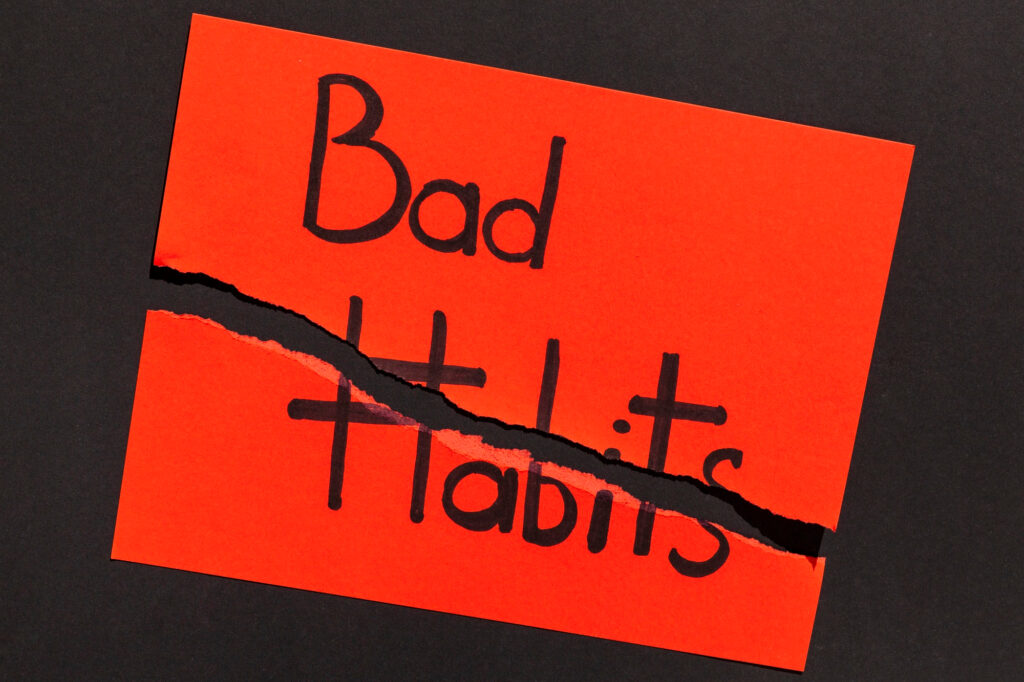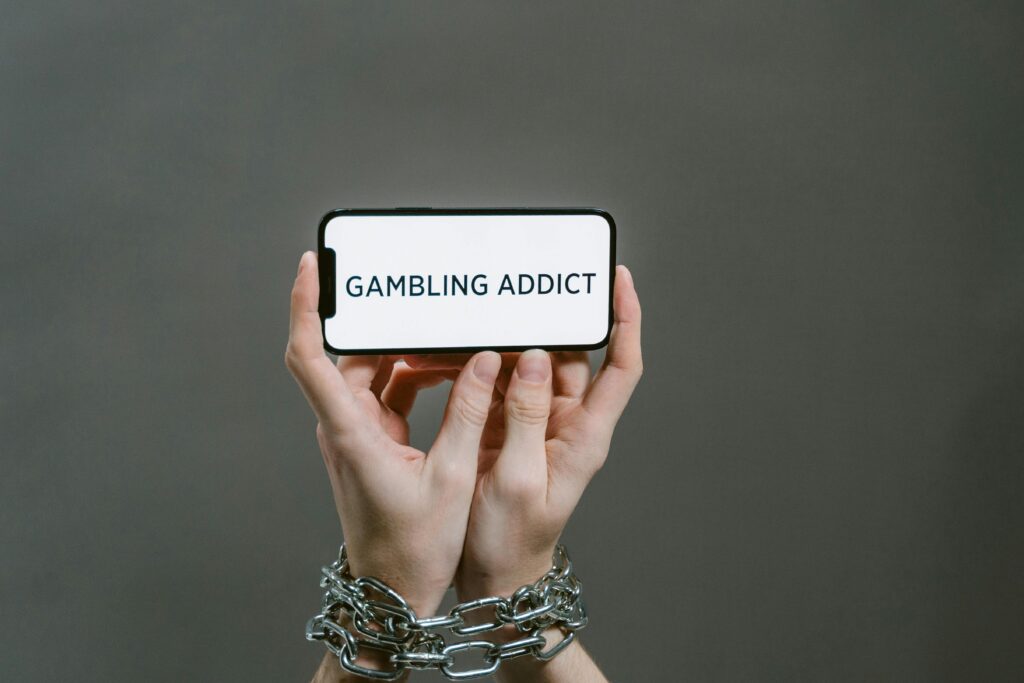
In today’s super-busy world, it’s easy to not pay attention to our daily habits & indulgences and how they influence our lives. We often fall into patterns that, in the beginning, may not seem harmful but which overtime may begin to have significant negative effects that take a toll on our health, relationships, and overall well-being.
This sheds light on some of these common bad habits, indulgences, and behaviours. It provides useful insights on how they can harm a man and stunt his progress in life, as well as offers actionable information on how to make a U-turn towards a healthier, happier and more productive life.
So, wear you seatbelt as we embark on a journey on self-reflection and improvement.
That said, here are 12 bad habits you MUST quit or never start as a man.
1. Pornography

Pornography comes with a host of serious problems that can affect your brain, body, relationship and the society at large. Below are a few.
- Breakup/separation
A study that monitored couples over time showed that porn consumption was the second strongest sign that a relationship would not endure. Research also shows that porn consumers are twice as likely to experience a divorce or breakup as a result of the unrealistic expectations and resultant sexual dissatisfaction that come from believing in porn.
- Encourages violence
Porn is also confirmed to fuel violence, abuse and unhealthy stereotyping. Research shows consumers are likely to sexually objectify and demean others, more likely to show tendency for rape, more likely to blame victims of rape, more likely to do nothing during a sexual attack against others, more likely to support violence against women, more likely to commit sex-related crimes, and the-list-goes-on.
- Unrealistic expectations
One of the lies the porn industry peddles is the fantasy of a better and more fulfilling sex life. Don’t fall for this. In the real sense, what porn does is to make people more sexually ignorant and unfulfilled. Regular consumers of porn soon begin to have warped and unrealistic expectations of sex from their partners. For example, women think it’s normal for a man to last a decade during the act, while men expect women to have picture-perfect bodies. Chasing these unrealistic ideals breeds the disappointment that brings couple disconnections, breakups, or cheating.
- Sexual anomalies
Porn consumption also breeds a lot of the sexual perversions we see today. Masturbation, reliance on sex toys, disconnection from human sex, fetish sex, sex trafficking, child abuse, drug abuse, etc. are encouraged and normalized by pornography, directly or indirectly.
- Habitual
What’s more, porn can become addicting! Most porn consumers are shocked to find that this habit can become unbelievably hard to quit. And with all the associated disadvantages, porn just isn’t worth the trouble.
If you want to live a healthy and fulfilling life, free from contributing to sexual manipulation or an industry that thrives from sexually taking advantage of others, stay away from porn.
2. Masturbation

Masturbation is a common activity among men in which they stimulate their genitals for sexual arousal or pleasure. It is a natural and safe way to explore the body, enjoy pleasure, and build sexual tension. It helps in improving sexual health. In fact, masturbation in and by itself is not a harmful activity.
However, excessive and daily masturbation has a couple of side effects and can potentially affect your personal life.
How so?
- Edema
This is a soft skin or slight inflammation in the penis that you may experience if you’re masturbating or ejaculating daily. It goes away in a few days, though.
- Self-guilt
Masturbation can make you feel dirty literally and figuratively. It comes a guilty feeling that you are hurting yourself physically or your religious and spiritual beliefs.
- Prostate cancer
Lots of research have been conducted to check if daily or excessive masturbation can increase the risk of prostrate cancer or not. This has not been proven yet, of course. In fact, there’s a popular opinion that frequent ejaculation helps reduce the chances of developing prostrate cancer.
However, the mere fact there are two strong opposing reports, none of which has been verified, raises some critical concerns. .
- Reduced sexual sensitivity
Masturbating aggressively and ejaculating daily may cause a loss in sexual sensitivity. When you’re masturbating, you hold your penis with a tight grip that feels good; penetrative sex with an actual partner may not feel as good anymore when self-pleasure becomes a norm.
- Personal life
If unchecked, frequent and heavy masturbation can offset your daily life routines in unexpected ways. You may start avoiding responsibilities (missing school, work, or social functions) or begin to be absent from family and your partner.
- Impulsive yearning
The pleasure of masturbation can become addictive. Like drugs, you slowly begin to look for more pleasurable highs, which leads to a more frequent and intensive indulgence. This habit, like already explained, can be harmful to your mental and physical well-being. It can ruin your relationships and interfere with your daily life routines.
3. Irresponsible/frequent sex

There’s no limit to how much sex anyone can have. In fact, regular sex is generally advised.
However, having excessive sex or indulging in irresponsible sexual behaviour might have undesirable outcomes on your physical or mental wellbeing.
The risks may include the following.
- Injuries
Excessive sex can cause penile chaffing and pain, back injuries, hip strain, and bed accidents.
What’s more, during sex the body uses a lot of muscle energy and puts a lot of pressure on the heart. This means that frequent and intensive sex activity increases the risk of cardiovascular diseases and blood pressure. Explains why we have several cases of men slumping and dying during sex.
- Infections and diseases
Bodily fluids are exchanged during sex. Irresponsible sexual behaviours like having too many partners or not safeguarding self properly can lead to contracting STDs.
- Exhaustion
As a high-energy activity, there’s a lot of calories burned during sex. If you indulge too frequently in the act, you’re going to be sore and sluggish in the morning after an action-packed night. Burnout can have a lasting effect that leaves you tired and less productive during working hours. To prevent this, find a healthy balance between your sex drive/sessions and how much your body can actually take to have a lively and productive output every day.
- Low sperm count
After sex and ejaculating, it takes a while for the sperm to reproduce. While the sperm never literally gets used up, the quantity and quality can be significantly affected if a man is constantly releasing. This can lead to low sperm count, which increases the risk of infertility.
- Financial losses
For a man, having sex usually involves money. Most times, you have to take care of all the bills before, during and after sex — the romantic outings, booking an accommodation, feeding, and the thanks-for-coming fees (if you know what I mean).
Imagine how much money leaves your pockets when you do this too frequently and with multiple partners! Besides, you’re still the one giving all “the pleasures”. It’s a disservice to self when you really think about it.
If you want to save money and build a future for yourself and those you care about, learn to put a lid on your sexual desires and lifestyle.
- Addiction
Too frequent sex can make your libido abnormally high and puts you in the risk of addiction. This can lead to irresponsible or extreme sexual tendencies like insatiable sexual needs, having multiple partners, relying on other objects or forms of expression for sexual pleasure, and committing sex-related crimes. Plus, there’s risk of contracting sexual infections.
4. Gambling

Gambling — compulsive gambling, especially — can have severe and lasting consequences for your life. It’s such a bad habit that it can and should be classified as a serious disorder or even considered a sin (in my opinion).
If there’s one habit you MUST NEVER indulge in, it’s gambling, for it can wreck you completely.
Only few people can gamble without much problems. For them, loss of money or financial harm is the main associated risk.
Most, however, suffer compulsive gambling. They spend more, gamble more, and have other traits that put them at increased risks of harm.
Some of the most common risks of gambling can be described in categories including financial harms, relationship conflicts, emotional and psychological turbulences, and health issues.
Let’s briefly examine each.
- Financial harm
Gamblers are usually financially irresponsible. They spend all their earnings and savings on gambling. Regardless of how much money or wealth a gambler has, if he doesn’t stop or put his habits in check, it’s only a matter of time before he files for bankruptcy.
- Relationship conflicts
Gamblers spend most of their productive and social hours indulging in this habit. This often leads to social isolation and neglect of relationships with their family and friends, a development that soon degenerates into conflicts and separations.
- Emotional/psychological turmoil
Loss of money and negligence of duties can trigger feelings of guilt, loneliness, isolation, and even suicide.
- Health issues
Steady preoccupation with gambling activities and constant loss of money can make a gambler focus less on self-care. Bad hygiene & self-care routines, poor eating habits, increased consumption of alcohol, use of illegal substances, and mental health issues have been recorded as common traits in chronic gamblers.
Gambling will disrupt your life, keep you disorganized, and (if unchecked) DESTROY YOU. Try to avoid gambling in any form, people who gamble, and places where it happens.
5. Lavish lifestyle

A lavish lifestyle might seem appealing, but several key issues revolve around it that can cause mental strife, relationship strain, and general life dissatisfaction.
Common drawbacks include the following.
- Financial stress
Maintaining a high lifestyle can cause financial pressure. Property, vacation, and fun are high-cost expenses that can lead to debt if managed wrongly.
- Social isolation
It becomes harder to create real connections and maintain trust when wealth is achieved. People can feel envious or bitter, leading to separation between individuals.
- Maintenance pressure
Operating a high-expense lifestyle builds up pressure to maintain image, and this can be tiring. This can lead to misplaced priority where one focuses on materialism rather than happiness and fulfillment.
- Loss of privacy
A flashy lifestyle can attract unwanted attention, which makes it hard to enjoy privacy. This may lead to stress, anxiety or insecurity.
- Shallow values
A lavish lifestyle can lead to a focus on material things instead of personal growth or meaningful pursuits. This can make you unfulfilled and purposeless.
- Mental health challenge
Maintaining a high-cost lifestyle comes with society expectations and pressures that can trigger anxiety, depression, and other mental health issues. If not checked, one may be pressured into taking rash decisions that harm self and others.
6. Not saving

A lack of savings will limit your options and make your personal, financial and professional life suffer. To achieve your goals (financial and otherwise) and push your life forward, there’s need to adopt a culture of saving. Otherwise, you will feel (and be!) stuck and overwhelmed.
Failing to save will expose you to the risk of the following situations.
- Lack of emergency funds
Lack of savings can lead to debt or financial stress when unexpected expenses such as health bills or car repairs call. As the saying goes, “save for rainy days.”
- Financial inflexibility
Without savings, you won’t have something to fall back on in the meantime when faced with unexpected disappointments like a sudden loss of job.
- Inability to invest
The first step towards investing is saving, and without it, you cannot build wealth or a sustainable future for yourself and your loved ones.
- Retirement challenges
Without sufficient savings, there will be no funds to sustain you through your retirement years. “Make hay while the sun shines” rings true.
Attaining financial stability without saving is near-impossible. Much worse, failing to save puts you in a very vulnerable position when disaster strikes. The thoughtful act of saving serves as a buffer against unforeseen circumstances and provides a foundation for future investment.
However, though, the best way to achieve financial stability is through a combination of saving and investing, too.
To improve your financial situation, consider budgeting, increasing income, reducing debt, and seeking assistance. Wise financial choices like these will significantly impact your financial well-being in the long-run.
7. Eating out frequently

People eat outside for a couple of reasons bordering around convenience.
Busy schedule and other responsibilities can make it difficult to find the time or energy to prepare meals at home. Dining out with family and friends is also a great way to socialize and spend time together. Some people also see it as a special treat or a way to enjoy foods that they normally wouldn’t prepare at home. And then, there’s also a matter of lack of cooking skills or confidence to consider. All great reasons — no doubt.
But then.
There are also the downsides to consider. Eating out regularly can be harmful to your health, pocket, and relationships. Let’s examine each.
- Health factor
Most food prepared outside the home often include high-calorie, processed and fatty nutrition. Too much consumption of such nutrients can cause chronic health conditions like obesity, cardiovascular diseases, and diabetes.
Aside nutritional value, there’s also the hygiene factor to consider when it comes to eating outside versus preparing your own meals. When you eat outside, you’re not exactly sure what you’re eating, because you’re not in control of how the food was made or what was used. Foods can be contaminated for several reasons, which can lead to botulism.
- Financial consideration
Eating outside is expensive and can drain your pockets if it becomes a regular activity. A single meal at even a fairly expensive restaurant can cost the same amount of money it takes to prepare a “healthy and more filling” meal at home that might go two, three, or more servings. When you dine at home, you save money.
- Better discipline
Eating out makes it harder to maintain discipline, especially when it comes to keeping important dietary restrictions or avoiding foods that you’re allergic to. This is especially more difficult when you have to dine with friends and family.
- Family time
Dining at home provides a great opportunity for family bonding. Over dinner, you can talk to your kids about school or your significant other about their busy day.
Men who can easily afford outside meals but choose to always eat at home often make excellent spouses to their partners and great fathers to their kids.
8. Late night

Staying out late comes with certain downsides that affect your health and safety, not to mention, it can also become a habit. A young man who is looking to soon get into family ways must curtail this habit for better bonding with his spouse and children.
- Sleep deprivation
Some of the top reasons to avoid late nights include:
Lack of sleep at night can change the natural sleep-wake circle (or circadian rhythm) of your body or impair your cognitive abilities. This disruption can make it hard to fall asleep, wake up, or feel alert at the right time.
- Health risks
Habitual late nights can lead to insufficient sleep, which is linked with a host of health issues. These include subdued immune function; greater risk of chronic conditions such as obesity, cardiovascular diseases, and diabetes; and mental health issues like anxiety and depression.
- Safety reasons
Most crimes, accidents, and other forms of dangers happen at night. Or at least have increased chances of happening during this hour. Staying out late exposes you to these risks.
- Family time.
Keeping late nights means you cannot always be home on time to your lovely wife and beautiful kids. A sensible man should be home at the right time to dine together and interact with his family or loved one(s) for a better bonding experience.
Responsible people don’t keep late nights without a good reason. Aside the reasons discussed, staying out late will also often involve money. This is why most night crawlers usually have poor saving habits and bad lifestyles.
A man looking to live a good, healthy and productive lifestyle should embrace coming home early once he’s done with meaningful activities outside. That’s part of being accountable and kind to both self and others.
9. Sedentary lifestyle

One of the worst things you can do to yourself is doing nothing at all. Or being sedentary in your lifestyle.
Sedentary lifestyle isn’t just a lack of healthy behaviour but is itself an unhealthy behaviour. This typically involves very low-energy activities such as sitting or lying down. It’s not laziness per se, and that’s what makes it more dangerous, because even very busy and productive people can still qualify as living sedentary lives. Activities that do not use the arms, legs, or body much, or that do not provide much exercise are sedentary in nature. This can even involve solving some of the world’s biggest problems while sitting at your computer.
A sedentary lifestyle can wreak havoc on your body. It can put you at risk of major diseases and be detrimental to your lifespan. Other risk factors include reducing your sexual performance, affecting your mood, and increasing your blood sugar.
Read on to learn in more depth some of the ways to destroy your body when you don’t off your arse.
- Mood dip
Studies show that long periods of sitting can affect the mental well-being of an individual. Sedentary habits like watching TV, playing video games, whiling away hours on the phone, or other screen-based entertainment can upset the central nervous system and lead to anxiety.
- Increased risk of cancer
Sedentary lifestyle can lead to adding extra pounds. And studies have shown that higher levels of fat can increase the risk of various types of cancer. It also found that as high as 30-40 percent of cancers can be prevented through lifestyle adjustments that involved more physical activity.
- Increased risk of dementia
Studies show that your brain suffers when you stay idle for extended periods. This is especially true in older adults who have to deal with the possibility of dementia. Staying active keeps the brain young, fresh and productive.
- Increase in blood sugar
A 2020 research found that your sugar levels can spike if you live a low-energy life. Reducing inactive time and putting your body through periods of little work can improve your blood-sugar control, according to this study.
- Impaired sex life
An inactive lifestyle can lead to adding extra weight in the belly and around the weight waist. This can cause a (seeming) shortening of your penis and a reduction in the flexibility of your body. There are also the challenges of an increased risk of erectile dysfunction (ED) and a reduction in sperm quality.
Take responsibility for your sexual life by shunning inactive lifestyle and keeping your fitness on point. Remember that the work you do in the gym will yield results in the bedroom.
- Back pain troubles
Hunching over your computer for just a couple hours straight can cause lower back pain that lasts beyond work hours. The sedentary act of sitting for so long without breaks can put increasing pressure on the disks in your lower back. This causes a compression that leads to disk wear-out, a development that leads to back pain.
Whether lounging around idly at home or working productively at work all day, don’t get caught up in the trap of a sedentary lifestyle. The side effects are not immediate, which makes things more tricky.
Let the discussed disturbing consequences of a sedentary lifestyle drive you to break a little more sweat every day.
10. Laziness

Wikipedia defines laziness as “the emotional disinclination to activity or exertion despite having the ability to act or to exert oneself.” In simple terms, it is the unwillingness to do work or use energy.
A man (or person) should not be lazy. Laziness, like its close cousin “sedentary living”, comes with serious consequences. And here are a few.
- Low energy & health decline
Lounging around idly all day can result in low energy levels, and can significantly impact your health negatively. It puts you at the risk of chronic diseases like obesity, diabetes, and cardiovascular health challenges. Lazy living can also cause clogged arteries and attract body aches.
- Mental & physical slowness
Being lazy or idle over an extended period can make you become physically and mentally slow. The body and mind need regular exercise to grow strong and perform better.
- Financial consequences
As the saying goes, “there’s no food for a lazy man.” A reasonable adult should work to earn a living to be able to provide for self and family. A lazy man will not have enough (if any) to keep body and soul together, and will often have to beg or rely on others to do anything worthwhile for himself. The financial consequences of laziness can be embarrassing.
- Dirtiness
Laziness leads to dirtiness. Check most of the lazy people you know; they often have both dirty hygiene and poor lifestyle habits.
It takes a certain level of energy to wake up early for work, get off the bed, prepare a meal, do laundry, clean the house, go to the gym, drive to an appointment, and so on. A lazy person characteristically doesn’t have that physical energy or mental drive, so they never get anything done.
As a man aspiring to lead a productive life and achieve worthy goals, you must shun laziness in all its forms. A hardworking man will be able to gather enough to provide for himself and his family. He will earn their love, respect and support. Be that man.
11. Procrastination

Procrastination, the infamous thief of time, encroaches into your life to wreak havoc by stifling your productivity and stunting your outputs. It occurs when you delay completing a task you’ve set out to do, thereby leading to lack of productivity, poor performance, and heightened stress. And these are only just some of the negative effects of procrastination.
Let’s go through these in more depth.
- Lack of motivation
Procrastination can lead to lack of motivation — and vice versa. This absence of motivation can result in a decrease in the output in your academic, work, or personal life.
Constantly putting off tasks can also reduce your energy levels and belief in self. Consequently, your goals become more difficult to achieve and your growth becomes stunted. Working out or following a dietary plan becomes a hassle, for example.
- Relationship issues
Procrastination is a result of a bigger sneakier culprit — indiscipline.
Lack of discipline can lead to procrastination, which can significantly affect your personal relationships with others. People will often count on you to do something for them, but you will start to lose their trust when you are known to delay tasks or promises. This behaviour can inconvenience, disappoint, and annoy them, which can lead to a strained or broken relationship.
- Increased laziness
Postponing important tasks to focus on superficial engagements will reduce your attention span and increase your laziness. This can result in lower quality in performance and output, as well as unmet deadlines.
Possible consequences include unhappy customers or partners and strained relationships. Or worse still — potential loss or decline in income and opportunities for growth.
- Regret and remorse
Procrastination can cause feelings of regret and remorse. When deadlines draw closer and tasks pile up, panic and anxiety can set in. Putting off important goals can make us lose good opportunities and feel wasteful of precious time. This heavy feel of pain and disappointment can pin us down to stunt progress.
- Bad time management
Bad time management skills restrict our ability to prioritize properly, follow schedules and met deadlines. This can lead to decreased productivity, missed opportunities, and incurred penalties.
- Increased stress levels
Procrastination can do a number on your mental and physical health, with increased stress levels. Piling up unfinished tasks and activities can create a daunting heap that can leave you feeling anxious and hopeless. This also makes you more likely to make avoidable mistakes and regrettable decisions.
- Stunted growth
When we put off responsibilities instead of taking action on important tasks, our goals become further away from fulfillment. This can further lead to feelings of incompetence and resentment towards life, which also can cause mental health decline. Procrastination kills progress.
- Opportunity for limiting self-belief
Forming a habit out of procrastination is bad for your mind, as it can progressively create and reinforce thoughts of not being capable or disciplined enough to achieve any good.
Procrastination is the thief of time and an enemy of progress. Avoid it at all costs. This starts with shunning excuses no matter how legit and taking actions no matter how difficult.
12. Smoking, alcohol, drugs

Substance abuse probably tops the chart as the worst habit or indulgence you MUST totally avoid. While some of the other habits “might” somehow be managed, there’s no way around the abuse or addictive use of substances. Smoking, alcohol, and drugs cause extreme harm to the physical and mental health of abusers. Worse than addiction and harm, even, they lead to death.
Here’s why you must avoid this habit.
- Health reasons
Studies reveal that smoking clogs the arteries, causing a slowdown in blood flow. It also damages lung tissue and increases the risk of cancer. Shunning this habit will help boost your health and fitness.
- Employability
To be qualified to work at or apply for certain jobs, you have to be free of drugs, alcohol, or tobacco. Employers sometimes run random tests on their staff or applicants to ensure a safe work environment or hiring process.
- Self-confidence
Reliance on addictive substances cause mental and physical health problems. People who abuse these things usually find it hard to socialize and would often isolate themselves from others. They also go through changes in their physical appearance, which often causes them to feel insecure and less confident.
Freedom from these substances will make you more confident and reliable.
- Saner choices
Being hooked on drugs, alcohol, or tobacco can make you become disoriented and inconsistent. This can compromise your ability to make sane and safe choices. Don’t forget that one bad choice can lead to another, potentially throwing you in the middle of a vicious circle of unfortunate events.
- Save money
Addiction is costly. Putting a check on this habit will help you save a lot of money that would otherwise have gone to waste on pack after pack of cigarettes or other abusive substances.
- Happier life
It is true that smoking, drinking and drugs can offer some good high, but this is only short-lived. Excessive dependence on these things can cause mental health issues like anxiety, depression, fear, guilt, and so on. This can stop you from having a happy life.
- Better performance
Being addicted to abusive substances can make you preoccupied with chasing one high after another. This can take your attention away from productive engagements like school, work or family, thereby reducing your efficiency or availability.
- Look better
Cigarettes, alcohol and drugs can cause significant body changes such as stained teeth, husky voice, bloodshot eyes, wrinkled skin, and a gaunt appearance. Saying NO to these indulgences will improve your looks and make you happier and more confident.
The bottom line
Bad habits are easy to start but hard to quit. And the consequences, as we discussed above, are too serious to allow yourself indulge in them. So the grand strategy for breaking free is to not even start at all. But sometimes, we fall into these patterns without suspecting. Tasty little indulgences can turn into habits or even addictions, before you know it.
But.
Whether you’re already hooked or simply just tempted, there’s no need to put yourself down. That will only compound issues. We all fall prey to some of these habits, so you’re not alone.
The good thing is, by identifying these patterns, accepting accountability, and taking steps to adjust, we can break bad habits and emerge winners. Remember that big transformations start with small changes.
As an intentional man, you can get rid of these 12 bad habits today and step into a healthier, happier, and ultimately brighter future.
Now that you know what bad habits to avoid, what about the good habits a man must adopt? Well, maybe simply the opposites of the above-discussed. But then, there can be more!
We will discuss them next.







